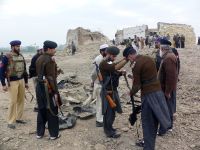Prime Minister Ehud Barak rated as "good" Friday the chances of forming an Israeli national unity government with right-winger Ariel Sharon, increasing the chances of a complete breakdown in the peace process.
"I think (the chances are) good, but for that, you need two," he said, asked about the prospects during a visit to the Jewish settlement of Gilo in Arab east Jerusalem.
Barak and Sharon, who have had no official contacts since the Sharm el-Sheikh peace summit, which wound up in Egypt on Tuesday, were due to meet later Friday, public radio said.
Sharon broke off talks when Barak announced the conclusion of the peace deal, now near breakdown, to put an end to more than three weeks of violence that has killed more than 120 people, most of them Palestinians.
The Likud party chief, who for the first time edged past Barak in a poll published Friday, heaped criticism on Barak following the summit for accepting the resumption of peace talks based on the Camp David summit "as if nothing had happened."
Barak said that a government of national unity was "a necessity for the people and the country," adding he believed "the potential partners know that and will act on it."
Earlier, Sharon told army radio that "if it is possible to reach agreement (with Barak) on the means of ensuring the security of Israelis, that is a matter for discussion."
In a separate interview with CNN, Sharon hinted that a unity government could take a more hawkish stance in peace talks.
"When you join the government, you have to join or stay for something or on something. You have to decide about the political platform, political plans, what is going to be the peace process," Sharon said.
"We're seeing that unity is very important, when we see all those problems and dangers that Israel is facing in the present time," he said.
Sharon is despised by Arabs, who blame him for setting off the violence by his high-profile September 28 visit to Jerusalem's mosque compound, the most bitterly disputed site between Israelis and Palestinians.
He was also defense minister during Israel's 1982 invasion of Lebanon, during which Israeli-allied militias massacred Palestinian refugees.
A poll published Friday by the daily newspaper Maariv for the first time put support for Sharon ahead of Barak, with 41 percent of respondents favoring Sharon to 31 percent for the Labor prime minister.
Twenty-eight percent of Israelis said they "don't know" whom they support.
Support for both men was 36 percent in a poll in the same newspaper last week.
Asked if the two candidates were Barak and former Prime Minister Benjamin Netanyahu, 48 percent would support Netanyahu and 27 percent Barak, with 25 percent listed as "don't know."
Barak defeated the more hawkish Netanyahu by a landslide last year.
The latest poll showed 62 percent of Israelis supported the peace process with the Palestinians, with 33 percent against. "Don't knows" were put at five percent.
The poll was conducted this week by Gallup and questioned 620 adults. The margin of error was 4.5 percent -- GILO (AFP)
© 2000 Al Bawaba (www.albawaba.com)







